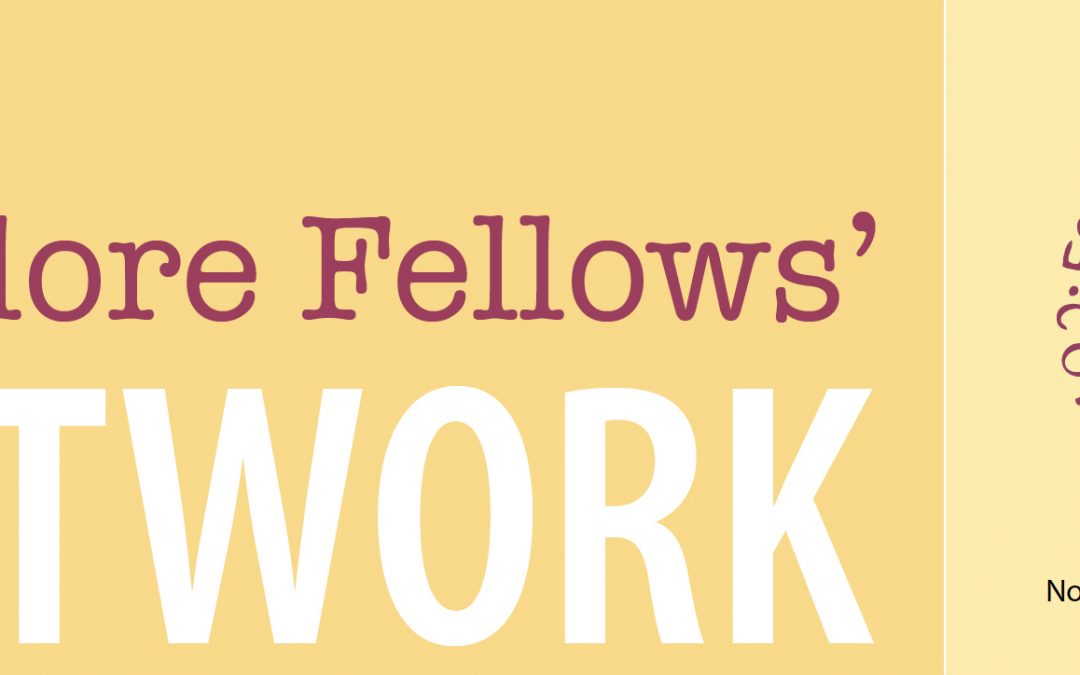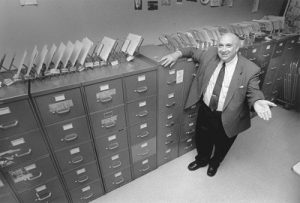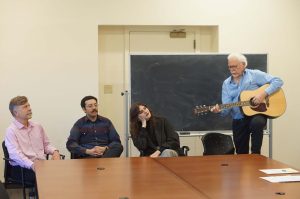Charles L. Briggs
Please join me on a whirlwind tour of the University of California’s Folklore Graduate Program. In 1957 William Bascom came to the Department of Anthropology. A specialist on African art, Bascom served as president of the American Folklore Society in 1953–1954. Trained at Indiana University in anthropology, folklore, and linguistics, Dell Hymes joined the Berkeley faculty in 1960; he convinced Bascom that hiring Alan Dundes would enable Berkeley to establish a preeminent folklore program (see Zumwalt 2017).
Recruited to the Anthropology faculty in 1963, Dundes created his celebrated course, The Forms of Folklore; enrollment reached some 500 each year, and Dundes became one of Berkeley’s most treasured teachers. The course inaugurated the Berkeley Folklore Archive, which houses folklore collected by students. Undergraduates still encounter submissions by such leading folklorists as Regina Bendix and Barbara Kirshenblatt-Gimblett in the Archive’s cavernous files. Dundes’ charisma and the post-World War II boom in U.S. support for higher education enabled the Folklore Graduate Program, opened in 1965, to thrive. Some BA and MA graduates stayed at Berkeley to earn PhDs through other departments, while others left for doctoral programs at Indiana University, the University of Pennsylvania, and elsewhere.
Forty-two years of stability under Dundes’s leadership ended with his sudden death on 30 March 2005. Joining the faculty just months later, I faced not the smooth transition that we had planned but the tasks of creating a vision for the future and assuring its fiscal and institutional base. I knew that the Program would be challenged by shifting university-wide priorities: A small academic MA program in an institution that emphasizes PhD programs and professional degrees was particularly vulnerable as the expansionist plans and generous support of prior decades gave way to belt-tightening agendas and boom/bust cycles affecting California’s public universities. Providing support for graduate students was much easier in 1965, when residents paid no fees, than in 2017-2018, when residents were charged $9,000 a year and nonresident graduate students $26,000.
The Folklore Graduate Group, which included Ronelle Alexander, Ben Brinner, John Lindow, Dan Melia, Candace Slater, and Bonnie Wade, created a “Designated Emphasis in Folklore,” enabling PhD students recruited into other units to include Folklore as part of their doctoral training and degrees. A second step enabled students to pursue the MA in Folklore and a PhD degree simultaneously. Two initiatives served simultaneously to honor Dundes’s contributions and secure Berkeley Folklore’s future. First, funds from the Alan Dundes Distinguished Chair in Folklore permit an annual Alan Dundes lecture. Secondly, the Dundes family, along with Dundes’s friends, colleagues, and former students, contributed to an endowment whose income enables the Program to name an Alan Dundes Graduate Fellow each year.
Towards a Multi-Genealogical Folkloristics
Creating new futures requires creating new pasts. Richard Dorson’s (1968) disciplinary genealogy projected a straight line from seventeenth century British Antiquarians to a single future for folkloristics—carefully shielding “authentic” folklore from “fakelore,” amateurs, popularizers, and other scholarly disciplines (see Bendix 1997). This genealogy intersected with race and colonialism only when folkloristics traveled into the British Empire, and Dorson overlooked the contributions of Indian “assistants” (see Naithani 2006). Rather than trying to enshrine a single vision of folkloristics, Berkeley’s program began in 2005 to place a multi-genealogical folkloristics at the center of graduate training (see Briggs and Naithani 2012). Two aspects are key:
First, Américo Paredes (1958) constructed folklore as revolving not around homogeneous national cultures but heterogeneity, race, conflict, power, and borders. Reading work by South Asian and Latin American folklorists and scholars from U.S. racialized minorities suggests the importance of genealogies that do not begin with white, northern European elites. Second, building alternative archives involves not simply rejecting the canon but developing new ways of reading canonical texts. For example, Dorson positioned John Aubrey as a folkloristic father figure who discovered Englishness in rural people. Rereading Aubrey involved seeing how he wove English folklore into a broader colonial tapestry that included Asia, the Americas, North Africa, and colonized Ireland. We trace how Aubrey fashioned traditional subjects in dialogue with visions of modern subjects emerging through Locke’s writings on language and politics and Boyle’s and Newton’s program for scientific knowledge (see Bauman and Briggs 2003).
Positioning Berkeley as the center for multiplying genealogies would reproduce Euro(-American)centrism. A persistent feature of Berkeley’s Program has thus been its international reach, recruiting folklorists from other countries as visiting faculty members; recent visitors include Pertti Anttonen, Rahile Dawut, Valdimar Hafstein, Galit Hasan-Rokem, Sadhana Naithani, Diarmuid Ó Giolláin, and Kwesi Yankah. Moreover, we recruit graduate students who have specific forms of training and/or life experiences that position them to read the canon against the grain in particular ways. From 1965 through the present, it is the diverse interests of graduate students, along with the quality and creativity of their scholarship, that drives our goal of training leaders who will ensure the discipline’s future vibrancy.
Conclusion: New Pasts for New Futures
Our program resolutely remains the Berkeley Folklore Program. This disciplinary commitment does not signal, however, acceptance of the sort of boundary-work that fosters intellectual isolation or limits efforts to challenge the discipline’s geopolitical and historical underpinnings. How, then, can programs form vibrant parts of larger intellectual debates without sacrificing the discipline’s future? We have learned three lessons regarding the need to continually create and critique visions of folkloristics’ pasts in order to fashion new futures: First, folkloristics’ pasts are less history lessons you learn in graduate school than forms of commonsense that limit presents and futures. If our students are to make new futures for the discipline, they must construct their own histories; uncritically reproducing the ones we have fashioned will constrain their potential contributions. Second, both accepting canonical genealogies and just beginning with current scholarship leave Eurocentric genealogies and racialized hierarchies in place. In the face of demands to recognize the contributions of scholars from U.S. racialized minorities and countries beyond the Euro-American orbit, declaring “game over—no more genealogies, please!” would leave those exclusions in place, impoverishing the range of ideas that count as folkloristics’ stock-in-trade. Third, by viewing the discipline in relation to other scholarly traditions, folklorists position themselves not as isolated advocates for a vanishing object (folklore) but as offering unique insights into ways that regimes of knowledge and power are made.
- Alan Dundes in the Berkeley Folklore Archive. Undated; permission courtesy of the Dundes family.
- Undergraduates working in the Berkeley Folklore Archive, 2017.
- Visiting Professor John McDowell performing a corrido during a podcast interview with (left to right) Charles Briggs and graduate students Cameron Johnson and Leah Simon, 2019. Photograph by Elena Klonsky.
References
Bauman, Richard and Charles L. Briggs. 2003. Voices of Modernity: Language Ideologies and the Politics of Inequality. Cambridge: Cambridge University Press.
Bendix, Regina. 1997. In Search of Authenticity: The Formation of Folklore Studies. Madison: University of Wisconsin Press.
Briggs, Charles L., and Sadhana Naithani. 2012. “The Coloniality of Folklore: Towards a Multi-Genealogical Practice of Folkoristics”. Studies in History 28(2): 231–270.
Dorson, Richard M. 1968. The British Folklorists. Chicago: University of Chicago Press.
Naithani, Sadhana. 2006. In Quest of Indian Folktales: Ram Gharib Chaube and William Crooke. Bloomington: Indiana University Press.
Paredes, Américo. 1958. With His Pistol in His Hand: A Border Ballad and Its Hero. Austin: Univ. of Texas Press.
Zumwalt, Rosemary Lévy. 2017. “‘Here is our man’: Dundes Discovered, The Development of the Folklore Program at the University of California, Berkeley”. Journal of American Folklore 130(515): 3–33.




